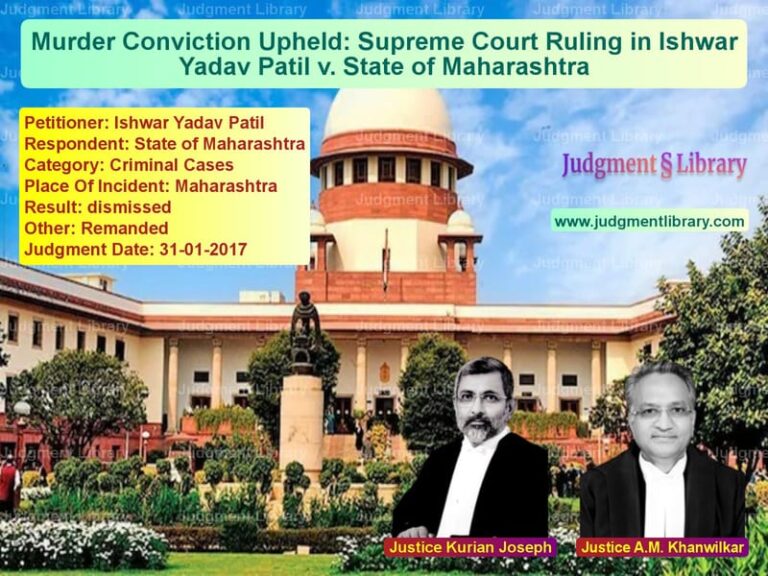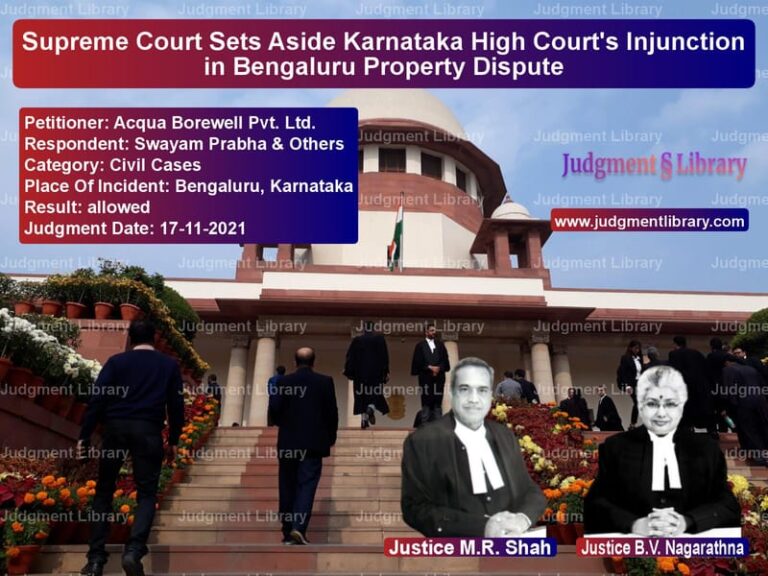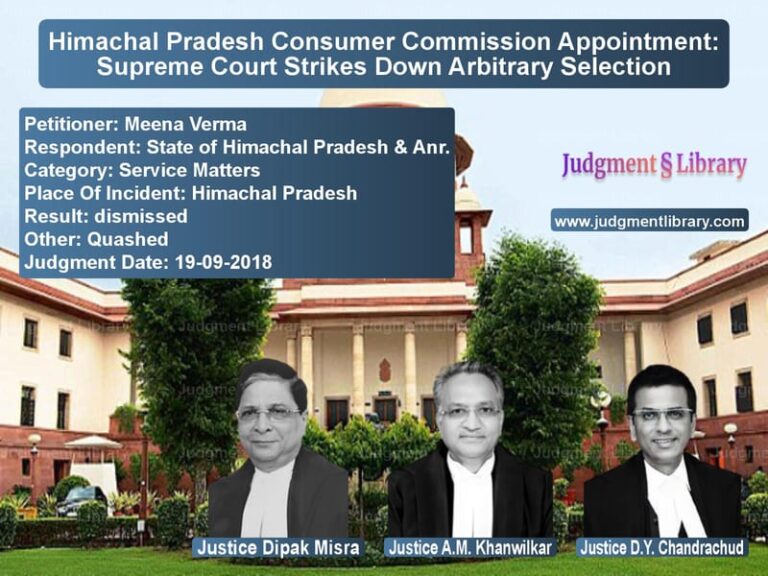Consumer Insurance Claim and Policy Terms: Supreme Court’s Ruling on HDFC Ergo’s Rejection
The case of Anju Kalsi vs. HDFC Ergo General Insurance Co. Ltd. & Anr. is a crucial judgment concerning the rejection of an insurance claim based on policy conditions that were allegedly not communicated to the insured. The Supreme Court had to determine whether the insurer could deny the claim due to a condition that required a non-ATM debit card transaction within a specific period prior to the insured’s death.
The judgment underscores the importance of transparency in insurance agreements and sets a precedent on how insurers must communicate policy conditions to policyholders.
Background of the Case
The dispute arose when the appellant’s son, an account holder with HDFC Bank, obtained an insurance cover under the “Cardsure Package Policy” issued by HDFC Ergo General Insurance. The insurance was linked to the bank’s debit card holders, offering a base cover of ₹5 lakhs and an additional cover based on debit card usage, with a maximum coverage of ₹10 lakhs.
On 30th October 2013, the appellant’s son died in a road accident. As his nominee, the appellant filed a claim under the policy, which was repudiated by the insurer on 17th December 2013. The insurer argued that the insured had not made a non-ATM debit card transaction in the three months preceding his death, which was a mandatory condition for claim eligibility.
The appellant then filed a complaint with the District Consumer Disputes Redressal Forum (District Forum), which ruled in her favor, awarding ₹5 lakhs along with interest and compensation. The insurer appealed to the State Consumer Disputes Redressal Commission (SCDRC), which reversed the decision, agreeing with the insurer’s claim rejection. This decision was upheld by the National Consumer Disputes Redressal Commission (NCDRC), leading the appellant to approach the Supreme Court.
Legal Dispute Over Policy Conditions
The primary issue before the Supreme Court was whether the insurance company could reject a claim based on a policy condition that had not been explicitly communicated to the insured.
Relevant Legal Provisions
- Consumer Protection Act, 1986: Governs disputes regarding unfair trade practices and deficient services by businesses, including insurers.
- Principles of Insurance Law: Insurers must ensure that policyholders are fully aware of the terms and conditions of their coverage.
Arguments Before the Supreme Court
Appellant’s Arguments
The appellant’s counsel argued:
- The insurance company never issued a policy document or its terms and conditions to the insured.
- The insured was only provided with a covering letter that stated the policy coverage but did not mention the condition requiring a non-ATM transaction.
- The insurer failed to prove that the insured had received any policy documentation explaining the condition.
- The rejection of the claim on the basis of an undisclosed condition was an unfair practice and amounted to a deficiency in service.
Insurance Company’s Arguments
The insurer countered:
- The policy clearly stated that a non-ATM swipe transaction within the stipulated period was a prerequisite for claim eligibility.
- The debit card usage guide, which contained the policy conditions, was provided to all account holders.
- The policy terms were available through the bank, and it was the responsibility of the insured to be aware of them.
- The insurer had no deficiency in service as it was following the stipulated policy conditions.
Supreme Court’s Judgment
The Supreme Court ruled in favor of the appellant, overturning the decisions of the SCDRC and NCDRC. The key findings were:
- The insurer failed to provide evidence that the insured had received and understood the policy conditions.
- The condition requiring a non-ATM transaction was not explicitly communicated to the insured at the time of issuing the policy.
- It was the duty of the insurer and the bank to ensure that policyholders were made fully aware of all conditions affecting their eligibility for claims.
- The insurer’s rejection of the claim amounted to a deficiency in service and was unfair to the policyholder’s nominee.
The Supreme Court observed:
“The policy terms must be clearly communicated to the insured, and an insurer cannot reject a claim based on a condition that was not explicitly made known to the policyholder.”
Key Observations from the Judgment
- Insurance contracts must be transparent, with clear disclosure of all terms and conditions.
- Unilateral conditions imposed by insurers, without proper communication to the insured, cannot be used to deny claims.
- Banks and insurers must take necessary steps to ensure policyholders are aware of all policy conditions before enrolling them in insurance schemes.
- The ruling reinforces consumer protection laws by preventing insurers from unfairly rejecting claims.
Impact of the Judgment
This judgment has far-reaching implications for the insurance industry and consumers:
- For Policyholders: Ensures that insurers cannot reject claims based on undisclosed conditions, strengthening consumer rights.
- For Insurance Companies: Highlights the need for insurers to improve transparency and clearly communicate policy terms to customers.
- For Banks: Emphasizes the responsibility of banks in informing account holders about insurance terms linked to debit or credit cards.
- For Consumer Protection Laws: Reinforces that unfair trade practices in insurance policies will not be tolerated by the courts.
Conclusion
The Supreme Court’s decision in Anju Kalsi vs. HDFC Ergo General Insurance Co. Ltd. sets a vital precedent in insurance law and consumer protection. By ruling against the insurer’s attempt to reject a claim based on an undisclosed condition, the judgment ensures greater transparency and fairness in the insurance industry.
This ruling serves as a reminder to insurers and banks that policyholders must be explicitly informed of all relevant conditions at the time of policy issuance. The decision strengthens consumer rights and ensures that unfair insurance practices do not deprive beneficiaries of legitimate claims.
Petitioner Name: Anju Kalsi.Respondent Name: HDFC Ergo General Insurance Co. Ltd. & Anr..Judgment By: Justice Dhananjaya Y Chandrachud, Justice Surya Kant.Place Of Incident: Bhatinda, Punjab.Judgment Date: 21-02-2022.
Don’t miss out on the full details! Download the complete judgment in PDF format below and gain valuable insights instantly!
Download Judgment: anju-kalsi-vs-hdfc-ergo-general-in-supreme-court-of-india-judgment-dated-21-02-2022.pdf
Directly Download Judgment: Directly download this Judgment
See all petitions in Other Insurance Cases
See all petitions in Insurance Settlements
See all petitions in Judgment by Dhananjaya Y Chandrachud
See all petitions in Judgment by Surya Kant
See all petitions in allowed
See all petitions in Quashed
See all petitions in supreme court of India judgments February 2022
See all petitions in 2022 judgments
See all posts in Insurance Cases Category
See all allowed petitions in Insurance Cases Category
See all Dismissed petitions in Insurance Cases Category
See all partially allowed petitions in Insurance Cases Category







